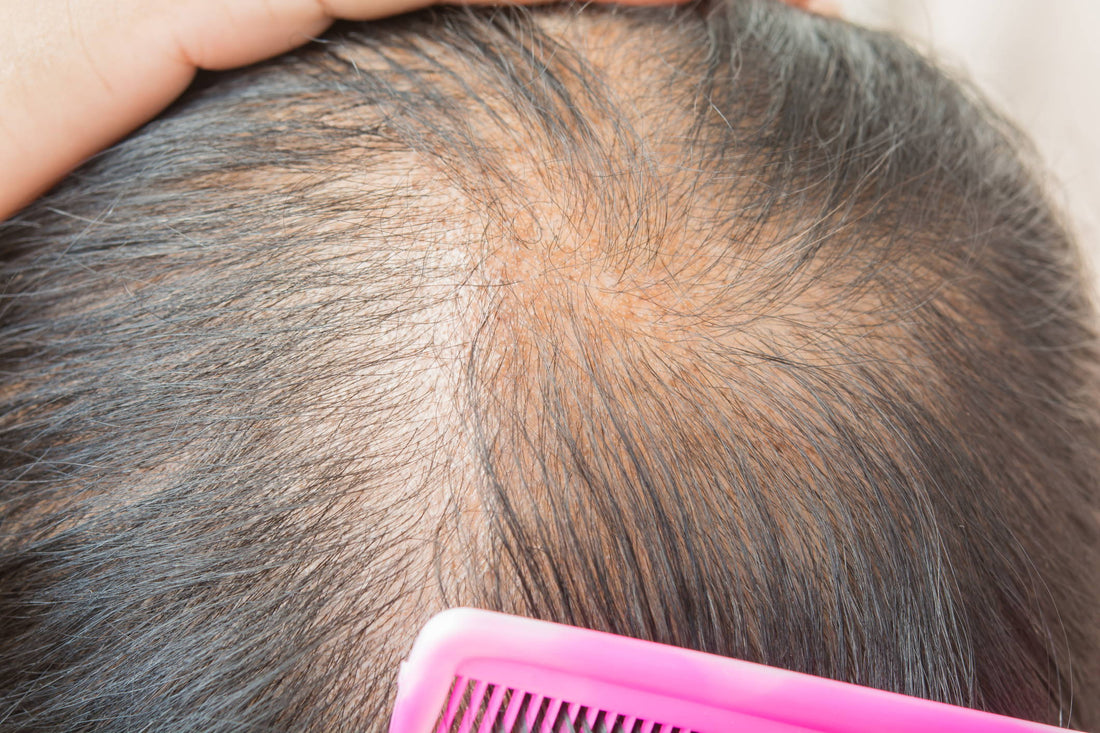Finasteride, which also goes by the brand name Propecia, is one of the most effective drugs for hair loss.
How does it work? By blocking the 5-alpha-reductase in our bodies.
5-alpha-reductase is the enzyme responsible for turning testosterone into dihydrotestosterone (DHT) — the male sex hormone responsible for weakening hair follicles and causing male pattern baldness. It can stop your body from producing DHT altogether, preventing further hair loss while promoting a healthier scalp and better hair growth.
Sounds pretty amazing, right?
Well, there’s a catch.
Finasteride isn’t a miracle treatment that will give you long-lasting results. It can only increase your hair volume if you use it consistently.
How does it affect hair loss? Let’s explore.
What Happens When You Stop Taking Finasteride?
Finasteride has a terminal half-life. It will take approximately 5 to 6 hours to suppress scalp, skin, and serum DHT levels in men between the ages of 18 and 60, and 8 hours in men over the age of 70. It works only when the drug is active in your body.
When you stop taking finasteride, your body will first try to live off the finasteride in your system. The medication in your system will start to decline within 7 days of taking the drug, causing your body to go back to its regular functioning. This means it will start to convert testosterone into DHT again, which will cause your hair follicles to shrink, thin, and recede as they did before you started taking the drug.
You’ll likely lose all the hair you’ve gained with the medication in one year. Ouch.
This process will happen gradually, but if you’re genetically prone to male pattern baldness(MPB), it can speed up hair loss. From hair thinning to hairline recession and other symptoms of male pattern baldness, you can expect to go back to your normal hair and scalp health when you stop taking the drug.
Additionally, if you're genetically susceptible to producing more DHT, it may weaken your hair follicles and cause thinning while your hair stops growing.
So, if you wish to continue to reap the benefits of this 5-alpha-reductase, use it daily.
But you may be wondering —
Is It Safe to Use Finasteride in the Long Term?
Finasteride is an effective drug for preventing baldness. Because its effects only work while it's in your body, you’ll have to take it daily for years to preserve and maintain as much of your hair as possible.
Lucky for us folks with thinning hair, finasteride is safe to use in the long term.
A study from the Prostate Cancer Prevention Trial that involved 19,000 men showed there’s little need to worry about the long-term consequences of finasteride.
This applies to 1 mg doses of finasteride. Taking higher doses (say 5 mg) can potentially increase any risks, however slightly, of high-grade prostate cancer in men over 55 years of age. While cancer is always a serious issue, note that this side effect is uncommon because finasteride is usually prescribed in 1mg doses to effectively treat hair loss.
If you decide to discontinue this medication for any reason, there are some side effects upon cessation that you should know about.
Side Effects When You Stop Taking Finasteride
Finasteride can seem like a miracle treatment for hair loss, but it does have its fair share of unwanted effects.
It can cause chills, cold sweats, dizziness, bloating, hives or welts, and a horde of other mild side effects, but the most common and the most challenging side effects are depression and sexual dysfunction.
The last condition can manifest in a variety of ways, including erectile dysfunction, ejaculatory dysfunction, a decrease in libido, and more. This can be triggering for men since masculinity is often associated with sex appeal.
The good news is in many cases, the side effects of finasteride stopped within 5 days of discontinuing it. However, some men reported that they continued to experience sex-related side effects like erectile dysfunction (impotence) beyond 5 days.
This phenomenon is called post-finasteride syndrome (PFS). It can be experienced for months and even years. These symptoms have been known to worsen if you continue taking finasteride while experiencing serious side effects.
While research in this area is limited, studies are ongoing, so here’s hoping that more information will be shared with the public soon.
The Verdict: Finasteride Is Effective but Requires Caution
Finasteride is impressively effective since it can stabilize hair loss in 90% of men.
The only catch is its effects only work while the drug is present in your body, so you may lose the hair you’ve gained when you stop taking it.
As for the side effects, most will go away on their own. If any side effects persist, seek medical advice. As always, it's a good idea to understand the risks involved before you start taking any medication.

